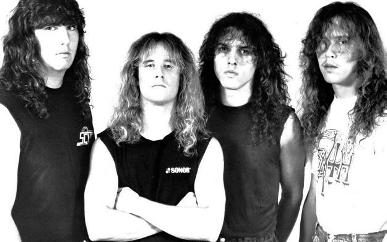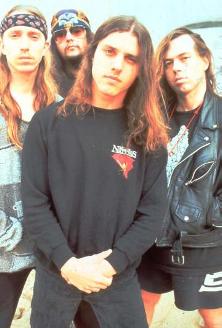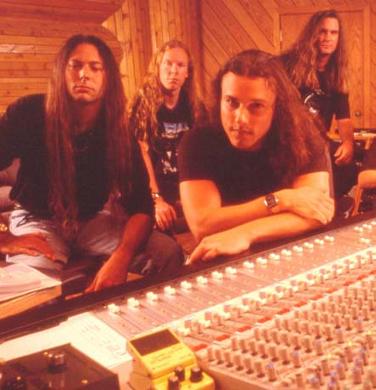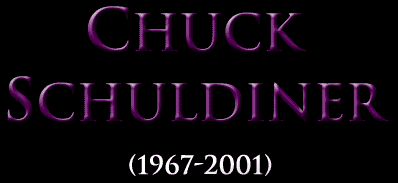
|
"Life
ends so fast, so take your chance, and make it last."
"Pull the Plug" |
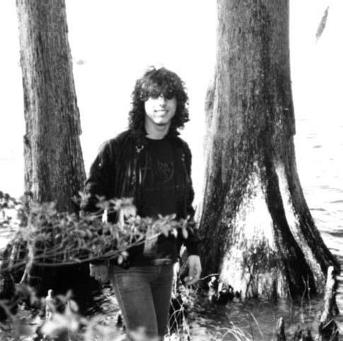
|
|||||||||||||
|
A retrospective on Chuck Schuldiner
(Death & Control Denied) has been long overdue. Unfortunately
Chuck will not be around to read these words. Chuck was 34 when
he passed away on Thursday, December 13, 2001, after a long bout
with brain stem cancer. It was a sad day for metal. I'd been researching
and writing this piece for months when the news came. Chuck's
suffering is over, but his memory remains bright. In '96 I penned
a Death article for my zine Yawning Vortex to spread the
word about Chuck's new project, Control Denied. My services seemed
imperative again when Chuck was diagnosed with cancer in '99.
I'd intended this to be a retrospective, not a memorial.
The energetic metal axeman and
gravel-throated vocalist didn't always have 8 studio albums under
his belt. He was born Charles Schuldiner on May 13, 1967 in Long
Island, New York, the son of Mal and Jane Schuldiner. Chuck's
began a long way from the famous Whisky in Hollywood or the Dutch
Dynamo Open Air Festival. In the quiet Orlando, Florida suburb
of Altamonte Springs Chuck spent most of his life. It was late
1983, according to metal journalist Borivoj Krgin, when Chuck
was joined by guitarist Rick Rozz (a.k.a. Frederick DeLillo) and
drummer/vocalist Barney "Kam" Lee to form the Mantas,
the precursor to Death. The primitive metal birth pangs for Chuck
& Co. were filled with an urge to shock audiences, fueled
by bravado and clashing personalities. Par for the course for
teenage kids forming a band, much less one of the heaviest metal
acts on Earth! The Chuck/Rick/Kam lineup only
played a few shows-as Kam put it, "covered in blood and gore...black
makeup around the eyes and stuff!" Hirax singer Katon DePena
contacted Chuck in the early days of the metal underground: "He
was young at the time but already showed signs of becoming one
of the elite in the underground. He was very into Hirax. He had
all our demos. Chuck sent us the rehearsals because he wanted
to see what we thought about his band. We thought they were great
and encouraged him to keep making tapes...I have some favorite
demos and that's in there with all of them. Fuckin' great...just
complete raw metal." Borivoj recalls first hearing about
Mantas "at the Metallica/Anthrax/Raven gig at the Roseland
in New York City back in August 1984. I happened to see a flyer
of theirs...put up by two guys, Mark [Conrad] and John [Gross],
who used to do a fanzine called Guillotine in Florida...it
contained a phrase along the lines of 'heaviest' or 'sickest',
which caught my attention. So I wrote to the address on the flyer...included
cash for the cassette, and got a letter backfrom
Chuck a few days later along with a copy of the Death by Metal
demo." Death's second official demo was
October 1984's Reign of Terror,
which Borivoj divulges "was never actually mixed-and cost
a whopping $80 to record!" Death gigged at Ruby's Pub in
Brandon, Florida, on November 9th and December 30th. The latter
show was taped by John and Mark from Guillotine and sold
as the only official live recording. Rick was out of the band
soon after. The 3-song Infernal Death demo appeared in
March of '85. Several more rehearsal tunes were committed to tape
by Chuck and Kam when Scott Carlson (bass) and Matt Olivo (guitar)
of Flint, Michigan's Genocide relocated to Florida in May to join
Death.
Matt and Scott paint a picture of Chuck, plugging away at a fast food job to accumulate equipment. "Here was Chuck from Death," Matt explained, "the coolest up and coming metal band, and he's wearing a Del Taco uniform with his hair pulled up." He may have worked his ass off, but, as Matt noted, "Chuck always had great support from his parents. He was never out in the cold with his metal." Jane and Mal Schuldiner were supportive of their son and his band. Scott relishes their time living at the Schuldiner house: "Chuck's mom was too sweet to deny us. She made dinner for us every night. She was an angel. Chuck's dad was always cool. They never gave him grief about anything...except like taking out the trash... when it came to Chuck's future they never stepped in and made decisions for him." "We had talked to someone at Combat that said 'make a demo and you've got a deal,'" said Scott. "Matt and I went down the mall where Kam hung out to talk him into coming back to the band. He was totally against it. That's when we knew...we weren't gonna get anywhere. We decided to go back home and regroup. And Chuck went and started his adventure. "We were all young.... When we left we didn't really know how to talk to Chuck about it. We knew it was gonna bum him out. Instead we talked to his mom, and she talked to him about it first." San Francisco was on Chuck's horizon Chuck and Repulsion awaited Matt and Scott. "He just wished us all the luck in the world and we did the same for him," Scott said. |
|||||||||||||
|
|
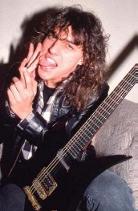 |
||||||||||||
Chuck wasted no time in heading out west again after his return to Florida. Chuck hooked up with drummer Chris Reifert on his second San Francisco jaunt. Chris revealed that he met Chuck before any big formal advertising could be done for musicians. "Early in the year. I heard he was looking for members out here. I already knew about the group...I was pretty excited...I got the gig. He was going to put an ad on the radio on a local station. A friend of mine told me about it before it even got aired. I got the phone number." Chris furiously pounded the skins behind Chuck's whirlwind guitars and acidic vocals as early as a two song rehearsal tape from late March '86. Chuck's bond with Chris Reifert was the defining point for improvement in Death's seedling sound. Chieko Redmer, then a young metal fan, met Chuck at Ruthie's Inn in '86: "I could barely even walk straight. I remember that he was standing against the wall inside, and I ploughed right into him-almost knocking him down! I didn't know who he was, but he helped me up and saw that I was very sick! I remember telling him I was about to puke. He was so nice that he escorted me outside so I could throw up in the planter! This was a pretty nice thing to do for a total stranger, not to mention it being embarrassing for me! He was a total gentleman. He presented me with a business card with the slogan 'Corpse Grinding Metal' on it! Very suave! We started hanging out after that, and I met Chris. They would practice at Chris' house in Concord. I'd go over there to watch...I never forgot how funny Chuck is! His wacky personality and silly sense of humor... He would say these goofy things back then like 'understand rubberband?' and 'know what I mean, jellybean?' Those days were great times...No responsibilities. It was a bummer when Chuck went back to Florida, but...Chuck never seemed to lose his humbleness even though he got famous." In April, Chuck and Chris quickly followed up Combat's request for a pro demo with Mutilation, the most polished of the early Death recordings. According to Bernard Doe of Metal Forces, Mutilation was made with "Chuck also playing bass." Doe conceded Mutilation was "the band's best recording to date; both in terms of material and production." The underground and Combat Records were in agreement about Mutilation. Despite the fact that the band was still only a duo, Combat signed them up to a five-album deal. |
|||||||||||||
|
|
Chuck's career as a professional
metal guitarist was just beginning, and before anything else could
be done a first album would have to be recorded. In summer of
'86, Chuck flew back to Florida with Chris with big pipe-dreams
about their first album ever, far from the recording capitol of
the world. It was in Florida where Chris notes Death "recorded
a version of the album and it got scrapped. Then we started over
again in L.A...It sounded really good at the Music Grinder." |
||||||||||||
|
Chuck expressed his approval of
Scream Bloody Gore to Metal Forces, "Randy
Burns gave us a super-heavy production...The only thing I kind
of regret now is not hanging around for the final mixes. I think
the rhythm guitar could have been a bit louder in the mix."
Not too shabby for the 5 days Chris claims it took to track SBG.
"Right after we did the LP as a two-piece," Chuck told
Metal Forces, "we ran into this guitarist, John Hand,
whom we really liked at the time, so we got him into the band.
He played with us long enough to have his photo appear on the
back of the album, but he just couldn't play our newer material,
so he had to go."Steve DiGiorgio remembers the lack of Death
gigs from that period, "We decided to do some shows, and
just figured we'd double session it. Chris double sessioned for
Desecration. We were gonna do a Desecration, Sadus, and Death
show where me and Chris both double setted. But that never happened
because Chuck went back to Florida and never came back."
Something was making Chuck homesick. He told Metal Forces,
"When I first moved to California back in late '85, the scene
was just starting to flourish. There were lots of places to play,
and the fan support was just overwhelming. Unfortunately, as time
went by, most of the clubs closed down and the scene just sort
of died out. I knew there was no way I was gonna be able to get
a band together there, so I decided to go back to Florida. I told
Chris he could move back down with me, but he said he didn't want
to." Chuck and Chris were metal brothers, though, and Chuck
wished him "good luck in the future" in his thanks list
on his second album.
It was Florida where Chuck based
himself for the rest of his career. 1988's Leprosy saw
Chuck leaning toward polished productions and an inner conflict
between the horror fan and the emerging philosophical, down-to-earth
Chuck. Leprosy reunited Chuck briefly with Rick Rozz, who
brought with him Massacre bandmates Terry Butler (bass) and Bill
Andrews (drums). "Pull the Plug," in particular, became
the song fans went absolutely nuts for whether in their bedrooms
or a crowded club. In his own words, Chuck told us that "Pull
the Plug" is about "being on a life support system and
having the right to die." Chuck explained to Metal Hammer,
"the lyrics are more serious and on the next album they will
get even more realistic." Leprosy saw Chuck's foray
into touring, on a double bill with Dark Angel. The road was-like
life in general-filled with ups and downs. Ex-Dark Angel guitarist
Jim Durkin informed me, despite rumors that have been spread that
he "got along really well with Chuck and everyone before
I left the tour and didn't look back. Chuck and I had a lot of
fun hanging out and jamming. It had nothing to do with us two." |
|||||||||||||
|
|
|
||||||||||||
|
|
After coming off the road in '95, Chuck hooked up with drummer Chris Williams (Talonzfury) and began working on his new project, dubbed Control Denied. Guitarist Shannon Hamm met Chuck through Chris Williams. "We became really good friends," Shannon said. "Then Chris invited Scott [Clendenin, bass] who was also in his band. So we all came from the same place here. We did a couple of demo tapes." Among Chuck's prospects for Control Denied singers was Warrel Dane, from Symbolic tour openers Nevermore. Commitments to Nevermore prevented that, but Chuck didn't give up, though Control Denied had to be put on hold. He was only too aware that Death fans were still hungry for more. Chuck told Metal Maniacs, "I do things when I feel they're right. There was label interest in Control Denied, but I felt that the time was right to bring Death back." Another slight lineup change occurred here. Shannon explained , "That's when we started working on the Perseverance stuff...and got Richard [Christy] in on drums." The Sound of Perseverance (1998) bludgeoned listeners with infectious heaviness from Chuck's introductory lead burst. Unaware of his fading mortality, Chuck had written "A Moment of Clarity", which tells us: "Life is like a mystery / With many clues, but with few answers / To tell us what it is that we can do / To look for messages that keep us from the truth." At the Ventura, California, Perseverance gig I hung out with Chuck for the first (and last) time. He signed my LPs and CDs, and I apologized for being such a fan-boy. But he understood. "I'm the same way," he said, "like with KISS." I spent the afternoon inside the venue, with no one around but Chuck's friend Maria Abril. It was unreal watching Chuck jam unaccompanied before everyone showed up for soundcheck. He didn't kick me out or wonder what I was doing there. As a matter of fact, he was one of the kindest musicians I've ever met! |
||||||||||||
|
|
|||||||||||||
|
|
The Fragile Art of Existence is what Chuck had wanted the public to hear since '93. Clear production, a solid lineup, and songs loaded with themes both personal and relevant to all people. The epic direction was made more accessible by the powerful voice of Tim Aymar (Psycho Scream). The title track closes out the disc with the prophetic lines: "No time for self-pity / No time for dwelling on what should have been / But is yet to be." In "Believe" there are further messages laced with experience from Chuck's life. Chuck tells us: "If I was paid for disappointment, I would be a wealthy man / The magic lives in sincerity, in truth, behind the thoughts I choose to stand... / Awaiting discovery". Chuck told Metal Maniacs, "These are words and things I need to re-embrace-not for music, not for that outlet-I need to re-embrace key words for a new survival...Life is fragile." Just before Chuck underwent surgery, MTV News covered his story online on the web. Family, friends, and fans braced themselves as Chuck entered the hospital. Chuck made another statement to the metal community following his successful surgery: "I am alive and letting the metal flow! I just finished writing the last song for the new Control Denied album...100% trend free. The responses to The Fragile Art of Existence have been really awesome. Thank you for embracing it! I also want to thank everyone around the world for the incredible support you have shown me. I read the emails and the letters and appreciate your kind words and honesty...I'm settling down here in Florida, feeling good and looking forward to getting busy again with the new record and tour to thank all my metal brothers and sisters in person with some new metal...Shazaamm!" Recovery went awry, even though we had hoped with all our metal hearts that Chuck would defeat cancer and continue to astound us with new slabs of raging metal. It was spring 2001 when Chuck fell more gravely ill. Maria Abril, who worked for nearly every label Death & Control Denied have been on was Chuck's friend from her days at Relativity Records. She spearheaded online auctions on Chuck's behalf. The donations and love flowed from the metal community, but all the money in the world can't erase the horrible side effects of experimental chemotherapy drugs and the gruesome killer known as cancer. |
||||||||||||
|
Perry M. Grayson |
|||||||||||||
